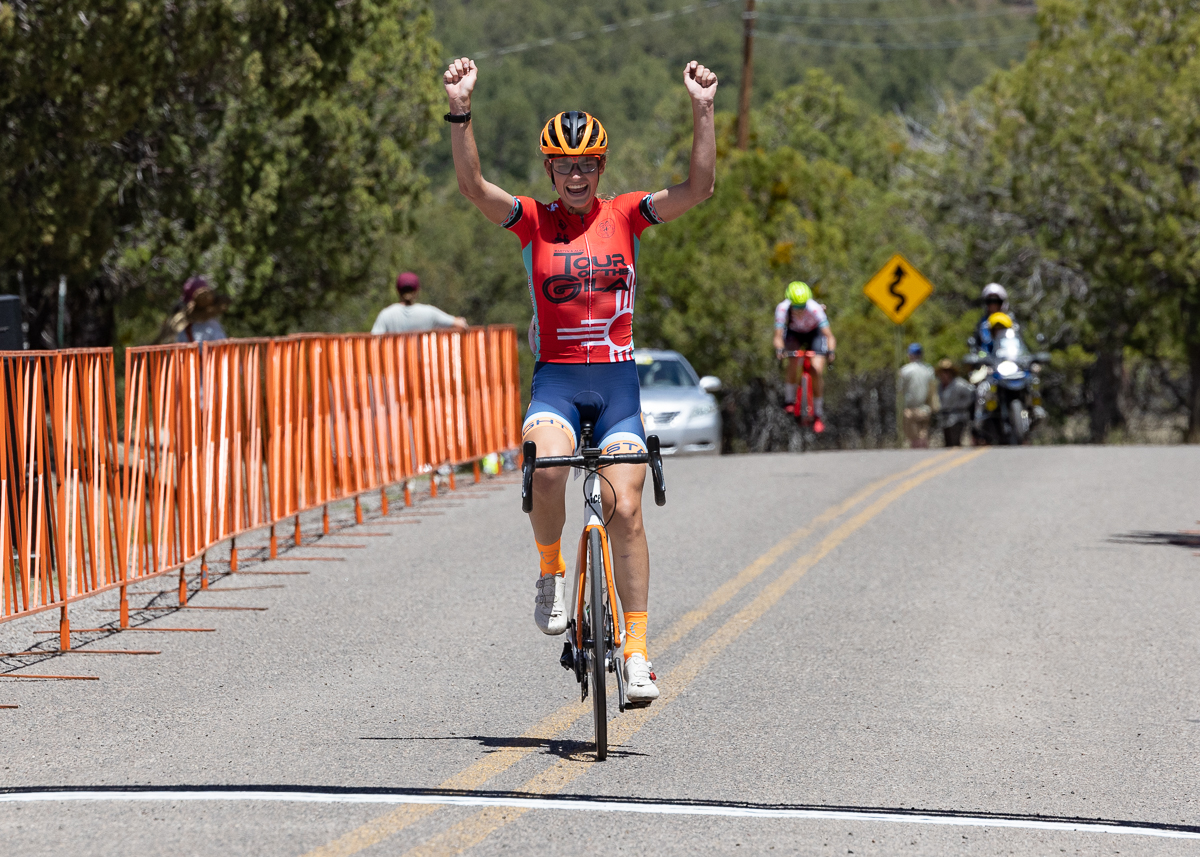
Professional cyclists are well accustomed to the highs and lows of the sport, but for transgender racer Austin Killips, the 'cruel optimism' that her dedication and intense training could result in a cycling career was crushed when, on July 14, 2023, the UCI announced it was reversing its inclusion policy and instituting an immediate ban on transgender women competing in elite women's races.
Killips had the race of her life at the Tour of the Gila, riding to victory on the final stage and taking home the overall classification, only to face an onslaught of abuse from critics who believe that inclusion of transgender women in women's fields is unfair.
It is hard not to draw a direct line between Killips' success and the ban when her victory in this low-ranked, minor race was splashed across the tabloid front pages and incited backlash from around the globe. When what had started as a dream descended into a nightmare, Killips had one reaction: to ride her bike.
"I just sat on the stoop and cried," Killips tells Cyclingnews of the moment she learned of the UCI ban. "It was just a really sad and unfortunate occurrence that I happened to be near the centre of in some ways. Obviously, it was significantly larger than any pursuits of any individual, athlete or person – it was just sad and frustrating.
"There's this cruel optimism of believing that if you train exceptionally hard and commit yourself, you can make it into the WorldTour or something - realising that the precise pathway that I had tried to carve out was bound to be my undoing was a bit of an unfortunate and sad thing to grapple with.
"My first impulse was to just go and ride my bike a lot – I think I logged a 42-hour week on the week that I got the news. I was just peddling all day every day, sunrise to sunset. I wanted to be on the bike, it was just about finding out how to continue doing it in a way that's sustainable and fulfilling – and hopefully not too filled with conflict."
Killips still struggles to understand how the sincere desire to be the best racer she could be has done the opposite of what most trailblazing athletes accomplish, "changing things for the worse", as she put it.
"I think I rode a great race, and I have many fond memories of how I rode with my teammates. We rode an exceptional race, and my training leading up to it was absolutely dialled, and I did what I set out to do.
"It's an interesting experience to achieve something significant or notable - it feels like a big accomplishment. And to have that oscillating between these extremely positive and extremely negative responses was a bit confounding. It's just a bummer, something I would never wish upon anybody.
"I think it's just unfortunate how many folks come out of the woodwork to be exceptionally cruel and seem to have the energy and dedicate so much time to it. My impulse is to just log off and avoid it as much as humanly possible."
Killips didn't start racing to be a trailblazer or a role model, she said.
"I wanted to race in the WorldTour – I wanted to race in Europe, and I wanted to be a domestique on some team and get a salary to ride my bike and train and race professionally. That was my desire. There was no ulterior, political motive.
"I am a trans person, and I occasionally speak to it, but my brand and existence were not deeply bound up with any of that stuff. It's never been the priority or the interest for me. I just like riding my bike a lot, and I'm actively still just trying to make it possible to continue to do cool and interesting things that people are stoked about on my bike."
For better or worse, Killips became a very visible figure last year, but this year, the Tour of the Gila has steered clear of mentioning her by name or using her image in their press releases or website. She avoided criticising them, however.
"It sure seems that they have been diligent about staying away from the controversy, and I'm sure that they also just don't want to have that conversation at all. And as somebody who does not enjoy partaking in those conversations online, it's hard not to empathise with that."
'Sport is just one small piece of the puzzle'
Some critics of transgender women being included in single-sex spaces believe trans athletes are changing their gender to be competitive, and that having been through puberty as a male gives them an unfair advantage, but Killips disagrees.
"Training 30 to 40 hours a week and adhering to structure religiously is just not something that a lot of people do. I know a lot of people in this sport, I've seen people's relationship to training and riding, and I see training blocks from other folks.
"I go back and I look at my training block from last year, and it was a ridiculous level of structure and regimentation and commitment to the process. I trained exceptionally hard and then produced results that were well within the bandwidth of the historical performances at Tour of the Gila over the years. I certainly was not out there shattering climbing records or anything – I just performed in line with how the pros who showed up to that race and won have performed."
Killips certainly did not transition just to be more competitive.
"My experience coming up in cycling was an incredibly nurturing and welcoming and supportive local racing scene that was just all of my peers who were women who I race bikes with. It wasn't this huge hot-button thing.
"The idea of infiltrating [women's sport] or something is just crazy. I've known the sport my whole adult life. The idea that you're infiltrating the sport for what? There's no glory. If you're a cyclist in the United States, there's nothing on offer.
"Sport is a point of entry for a much broader issue that these people have with trans people in general, and the belief that we're not what we say we are... I think what undergirds that is this sincere belief held by these people that trans people are faking it in some way – that it is a malady that's being improperly addressed with transition.
"Even if you could wholly convince somebody that participation in sport was sincere and fair and genuine, I don't even know if that's necessarily possible without sort of engaging with and untangling all of the other sincere and deeply held beliefs that a lot of people who are pro-exclusion seem to have. Sport is just one small piece of the puzzle, I guess."
Being visible has meaning for marginalised groups – representation can give inspiration to others to follow the same path. Killips had role models like fixed-gear racer Evelyn Sifton but didn't take up the sport to be an example, even if she unwittingly has become one.
"I think there are positive things that come out of representation and existing publicly, but that is not my central interest in it," she says, adding that she has heard from some people who've found inspiration from her success.
"I think that representation cannot be the end all be all of queer politics, or politics generally, but I think it is also necessary politically, and I think it is an important thing - in the same way that I had trans reference points and role models and people to look to as I was growing up, that were really essential. I think every, every individual who exists publicly in some capacity has an impact."
Killips hopes that the culture will "continue to shift and evolve over the years".
"We've seen a very rapid uptick in cultural acceptance of gay people over the course of the 21st century, so I would be shocked if we don't see a turning point [for trans people]."
Until then, Killips is going to be riding her bike... and riding, and riding, and riding some more.
"I like riding my bike a lot, and I'm actively still just trying to make it possible to continue to do cool and interesting things that people are stoked about on my bike," she said, detailing her plan to try to break the fastest known time (FKD) on the Arizona Trail – an 827-mile route through the state that Alex Schultz holds in 9 days, five hours, 43 minutes.
"It's terrifying and it's difficult, and it's unfamiliar, and there's an immense amount of research and learning that I have to do to tackle it, which feels exciting.
"I'm sure there will be people who are annoyed about it. I think I'm less concerned about some jerk using it to write another article that's copying and pasting the same political talking points from the previous ones than I am about thinking about 'do I want to publicise my spot tracker?'. 'Am I gonna get people physically harassing me? Do I want these people on Twitter to have access to my active location every day?'"
All the preparation has distracted Killips from the Tour of the Gila, although she is keeping up with how her friends are doing in the race.
"I'm interested in people I love and care about having success in the sport, but, yeah, I'm not feeling particularly sentimental," she said.
"I've been enjoying embracing new challenges and finding new things to learn in the sport. One thing I thought is if I was racing Gila again this year, I'd just be doing the same thing I did last year. So it's nice when I'm doing something unfamiliar and exciting."







